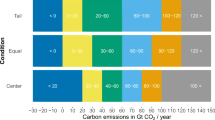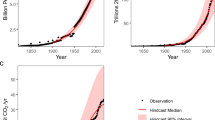Abstract
A variety of decision makers need projections of future energy demand, CO2 emissions and similar factors that extend many decades into the future. The past performance of such projections has been systematically overconfident. Analysts have often used scenarios based on detailed story lines that spell out “plausible alternative futures” as a central tool for evaluating uncertainty. No probabilities are typically assigned to such scenarios. We argue that this practice is often ineffective. Rather than expanding people’s judgment about the range of uncertainty about the future, scenario-based analysis is more likely to lead to systematic overconfidence, to an underestimate of the range of possible future outcomes. We review relevant findings from the literature on human judgment under uncertainty and discuss their relevance to the task of making probabilistic projections. The more detail that one adds to the story line of a scenario, the more probable it will appear to most people, and the greater the difficulty they likely will have in imagining other, equally or more likely, ways in which the same outcome could be reached. We suggest that scenario based approaches make analysts particularly prone to such cognitive biases, and then outline a strategy by which improved projections, tailored to the needs of specific decision makers, might be developed.
Similar content being viewed by others
References
Alpert M, Raiffa H (1982) A progress report on the training of probability assessors. Harvard University. Reprinted. In: Kahneman D, Slovic P, Tversky A (eds) Judgment under uncertainty: heuristics and biases. Cambridge University Press, New York
Armstrong JS (1978) Long-range forecasting: from crystal ball to computer. Wiley Interscience, New York
Armstrong JS, Denniston WB, Gordon MM (1975) The use of decomposition principle in making judgments. Organ Behav Hum Perform 14:257–263
Arnell NW, Livermore MJL, Kovats S, Levy PE, Nicholls R, Parry ML, Gaffin SR (2004) Climate and socio-economic scenarios for global-scale climate change impacts assessments: characterizing the SRES storylines. Glob Environ Change 14:3–20
Bracken P (1977) Unintended consequence of strategic gaming. Simul Games 8:283–318 (September)
Bracken P (1990) Gaming in hierarchical defense organizations. In: Goldberg AC, van Opstal D, Barkley JH (eds) Avoiding the brink: theory and practice in crisis management. Brassey’s, UK
Brewer GD, Shubik M (1979) The war game: a critique of military problem solving. Harvard University Press, Massachusetts
Budnitz RJ, Apostolakis G, Boore DM, Cluff LS, Coppersmith KJ, Cornell CA, Morris PA (1995) Recommendations for probabilistic seismic hazard analysis: guidance on uncertainty and the use of experts. Lawrence Livermore National Laboratory, UCRL-ID 122160
Budnitz RJ, Apostolakis G, Boore DM, Cluff LS, Coppersmith KJ, Cornell C, Morris PA (1998) Use of technical expert panels: applications to probabilistic seismic hazard analysis. Risk Anal 18:463–469
Casman EA, Morgan MG, Dowlatabadi H (1999) Mixed levels of uncertainty in complex policy models. Risk Anal 19(1):33–42
Craig P, Gadgil A, Koomey JG (2002) What can history teach US?: a retrospective examination of long-term energy forecasts for the United States. Annu Rev Energy Environ 27:83–118
de Finetti N (1974) Theory of probability: a critical introductory treatment. Wiley, New York
Edmonds J, Wilson T, Rosenzweig R (2000) A global energy technology strategy project addressing climate change: an initial report an international public–private collaboration. Joint Global Change Research Institute
EPRI (2007) The power to reduce CO2 emissions: the full portfolio. Available at: http://eprireports.org/DiscussionPaper2007.pdf
Fischhoff B, Slovic P, Lichtenstein S (1978) Fault trees: sensitivity of estimated failure probabilities to problem representation. J Exp Psychol Hum Percept Perform 4:330–334
Fox CR, Birke R (2002) Forecasting trial outcomes: lawyers assign higher probability to possibilities that are described in greater detail. Law Hum Behav 26:159–173
Fox CR, Clemen RT (2005) Subjective probability assessment in decision analysis: partition dependence and bias toward the ignorance prior. Manage Sci 51:1417–1432
Fox CR, Rottenstreich Y (2003) Partition priming in judgment under uncertainty. Psychol Sci 14:195–200
Goldberg AC, van Opstal D, Barkley JH (eds) (1990) Avoiding the brink: theory and practice in crisis management. Brassey’s, UK
Greenberger M (1983) Caught unawares: the energy decade in retrospect. Ballinger, Cambridge
Gregory WL (2001) Scenarios and acceptance of forecasts. In: Armstrong JS (ed) Principles of forecasting: a handbook for researchers and practitioners. Kluwer, Massachusetts
Grübler A, Nakicenovic N (2001) Identifying dangers in an uncertain climate. Nature 412:15 (July 5)
Harte J (1985) Consider a spherical cow: a course in environmental problem solving. W. Kaufmann, CA
Henrion M, Fischhoff B (1986) Assessing uncertainty in physical constants. Am J Phys 54:791–798
Kahneman D, Slovic P, Tversky A (eds) (1982) Judgment under uncertainty: heuristics and biases. Cambridge University Press, New York
Koehler DJ (1994) Hypothesis generation and confidence in judgment. J Exp Psychol 20:461–469
Lave LB, Epple D (1985) Scenario analysis. In: Kates RW, Ausubel JH, Berberian M (eds) Climate impact assessment. Wiley, New York
Lichtenstein S, Slovic P, Fischhoff B, Layman M, Combs B (1978) Judged frequency of lethal events. J Exp Psychol Hum Learn Mem 4:551–578
Lichtenstein S, Fischhoff B, Phillips LD (1982) Calibration of probabilities: the state of the art in 1980. In: Kahneman D, Slovic P, Tversky A (eds) Judgment under uncertainty: heuristics and biases. Cambridge University Press, New York
MacGregor DG (2001) Decomposition for judgmental forecasting and estimation. In: Armstrong JS (ed) Principles of forecasting: a handbook for researchers and practitioners. Kluwer, Massachusetts
MacGregor DG, Armstrong JS (1994) Judgmental decomposition: when does it work? Int J Forecast 10(4):495–506
Morgan MG, Henrion M, Small MS (1990) Uncertainty: a guide to dealing with uncertainty in quantitative risk and policy analysis. Cambridge University Press, New York
Morgan MG, Adams PJ, Keith DW (2006) Elicitation of expert judgments of aerosol forcing. Clim Change 75:195–214
Mullin TM (1986) Understanding and supporting the process of probabilistic estimation. Dissertation, Carnegie Mellon University
Nakicenovic N et al (2000) Special report on emissions scenarios. Cambridge University Press. Available online at: http://unep.no/climate/ipcc/emission/index.htm
OECD Nuclear Energy Agency (1999) Scenario development methods and practice, May
OECD Nuclear Energy Agency (2000) Features, events and processes (FEPs) for geological disposal of radioactive waste. An international database
Pacala S, Socolow R (2004) Stabilization wedges: solving the climate problem for the next 50 years with current technologies. Science 305:968–972
Parson E, Burkett V, Clarke L, Edmonds J, Fisher-Vanden K, Jacoby H, Keith D, Mearns L, Pitcher H, Reilly J, Richels R, Rosenzweig C, Webster M (2006) Scenarios of greenhouse gas emissions and atmospheric concentrations and review of integrated scenario development and application. US CCSP Synthesis and Assessment Product 2.1
Redelmeier DA, Koehler DJ, Liberman V, Tversky A (1995) Probability judgment in medicine: discounting unspecified possibilities. Med Decis Mak 15:227–230
Schneider SH (2001) What is ‘dangerous’ climate change? Nature 411:17–19
Schweizer VJ, Kriegler E (2007) Using cross-impact balance analysis to improve future emissions scenarios. Working paper. Carnegie Mellon University
Shell Group (2005) Shell Global Scenarios to 2025. Executive summary and excerpts available online at: http://www.shell.com/home/Framework?siteId=royal-en&FC3=/royal-en/html/iwgen/our_strategy/scenarios/dir_scenarios_28022005.html&FC2=/royal-en/html/iwgen/leftnavs/zzz_lhn5_4_0.html
Slovic P, Fischhoff B, Lichtenstein S (1976) Cognitive processes and societal risk taking. In: Carroll JS, Payne JW (eds) Cognition and social behavior. Halsted Press Division of Wiley, New York
Slovic P, Fischhoff B, Lichtenstein S (1980) Facts and fears: Understanding perceived risk. In: Schwing RC, Albers WA Jr (eds) Societal risk assessment: how safe is safe enough? Plenum, New York
Smil V (2003) Energy at the crossroads. MIT Press, Massachusetts
Tarr J (1996) The search for the ultimate sink: urban pollution in historical perspective. University of Akron Press, Ohio
Tversky A, Kahneman D (1983) Extensional versus intuitive reasoning: the conjunction fallacy in probability judgment. Psychol Rev 90:293–315
Tversky A, Koehler DJ (1994) Support theory: a nonextensional representation of subjective probability. Psychol Rev 101:547–567
US National Assessment (2001) Climate change impacts on the United States—foundation report. Cambridge University Press, New York
Wigley TML, Raper SCB (2001) Interpretation of high projections of global-mean warming. Science 293:451–454
Yergin D (1991) The prize: the epic quest for oil, money and power. Free Press, New York
Author information
Authors and Affiliations
Corresponding author
Rights and permissions
About this article
Cite this article
Morgan, M.G., Keith, D.W. Improving the way we think about projecting future energy use and emissions of carbon dioxide. Climatic Change 90, 189–215 (2008). https://doi.org/10.1007/s10584-008-9458-1
Received:
Accepted:
Published:
Issue Date:
DOI: https://doi.org/10.1007/s10584-008-9458-1




